A one-size-fits-all approach to CX doesn’t work anymore. Keep up with the competition by personalizing your company’s experience.
In recent years, B2C brands have been focusing their efforts on developing digital marketing capabilities, often with an emphasis on providing personalized customer experiences (CX) to ultimately foster trust, develop affinity and deliver recurring revenue.
There has been a rapid increase in the number and variety of marketing technology tools that are available, with chiefmartec.com showing more than 9,000 and growing annually. This has meant for B2C marketers looking to strengthen their CX prowess, choosing the correct, futureproof and scalable marketing technology as part of the wider stack is not always straightforward.
Acxiom released its The Future of Personalization in B2C Marketing surveyed 400 B2C senior marketing decision makers across the US, UK, Germany, Italy, and Spain to know How ready are brands to deliver quality digital CX and real-time personalization? And do brands consider real-time personalization the gold standard of quality customer experience?
First Party Data Is The New Normal
The research shows that many B2C businesses are well on their way to the transition to a ‘cookieless’ world. Amidst the need to build a complete view of the customer, first-party customer data has gained importance to organizations in their journey to delivering an enhanced digital CX. Most organizations state that first-party data has either been a priority for several years or its importance has increased in the last two years. US-based businesses lead the way, with 59% stating that first-party data has been a priority for several years, ahead of all other markets surveyed where less than half of organizations are in this position
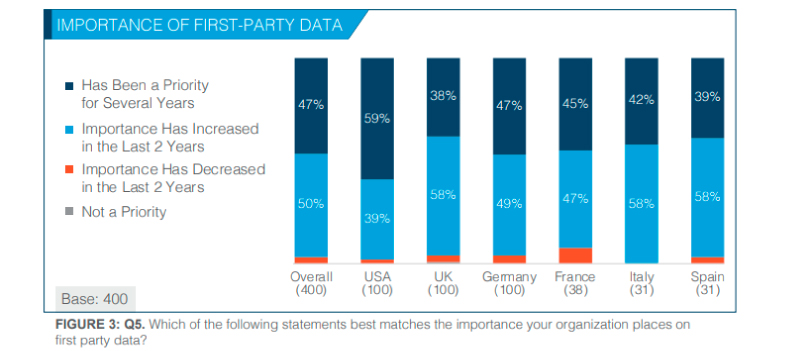
Organizations are using six sources on average when collecting first-party data on customers and prospects. As shown in the below figure, the most popular sources of data include CRM platforms, social media, and website analytics. Businesses in the UK (7), US (6), and Germany (6) tend to use more sources on average than those in France, Italy, and Spain (each using 5). Most prominent channels to collect customer and prospect data in the UK included CRM (80%), social media (77%), and in-store transactions (32%).
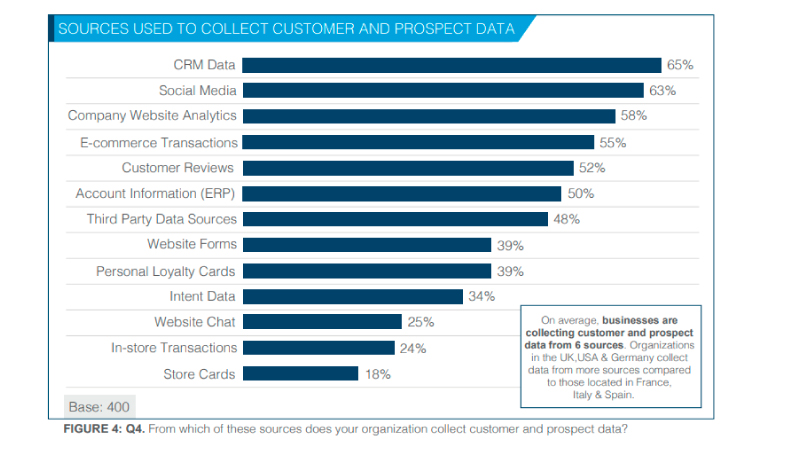
The Digital CXJourney
Most organizations regard improving digital CX as moderate (40%) to high priority (53%) on their marketing agenda. Businesses with over $300 million annual revenue and US-based organizations are most likely to say it is a high priority.
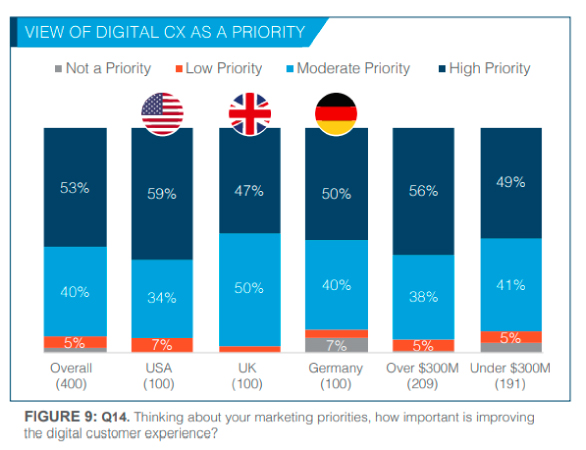
There is progress to be made for the majority of B2C organizations to realize their digital CX ambitions. Only one in four organizations feel they have fully implemented digital CX management capabilities today. Maturity is greatest in the USA and amongst businesses with $300m+ annual revenue. However, whilst a quarter feel well positioned in this area, the majority are still figuring out the best route to delivering their digital CX goals. Most B2C organizations are scattered across different stages in the journey, with the largest portion (40%) feeling they have mostly implemented digital CX capabilities. Almost a quarter (23%) feel they are around halfway to implementation, and the remainder (13%) describe their efforts as incomplete or not yet started.
Real-Time Personalization Is Front And Center Of Most Organizations’ Digital CX Strategies Today
Real-time personalization is currently the dominant digital CX activity, with 88% Of B2C organizations reporting that their current strategy includes delivering real-time personalization. However, it should be noted that ‘personalization’ in general is a broad term and could encompass a range of activities. It is followed closely by improving the use of data for marketing efforts (70%) and campaigns (69%)—two strategies which are critical to building a solid foundation for personalization.
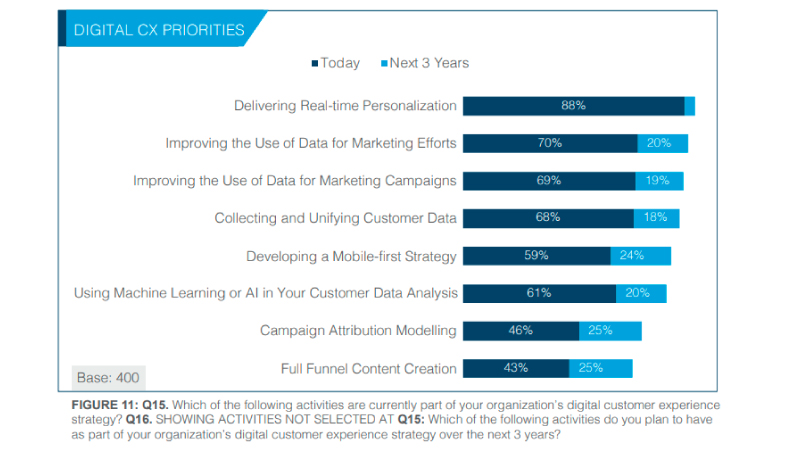
Real-time personalization is expected to remain a core marketing priority over the next three years, with 79% of b2c organizations stating that it will be very important —an increase of 15% upon those who say it is very important today (64%).
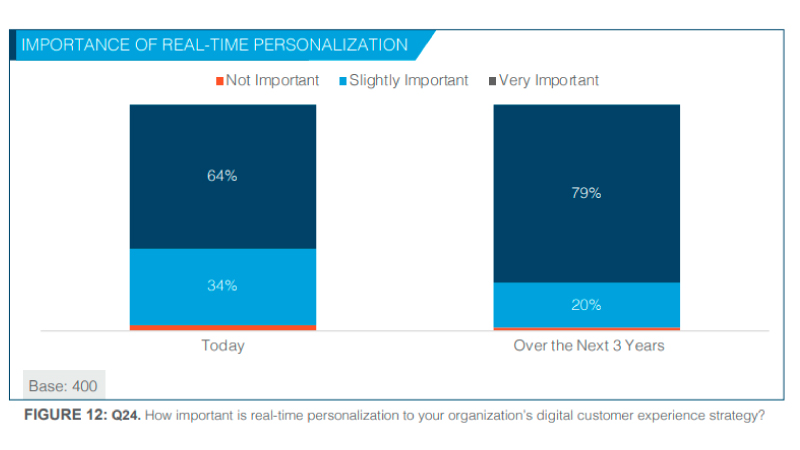
The Three Stages To B2C Digital CX Maturity
This research shows that there is significant variation between B2C organizations in terms of where they are on their journey to deliver excellent digital CX. Some are well established in their efforts with a multi-pronged marketing technology strategy, while others still have some way to go to determining the right approach for their brand. Based on their digital CX maturity, organizations can be divided into three distinct segments which help us understand their position on this journey.
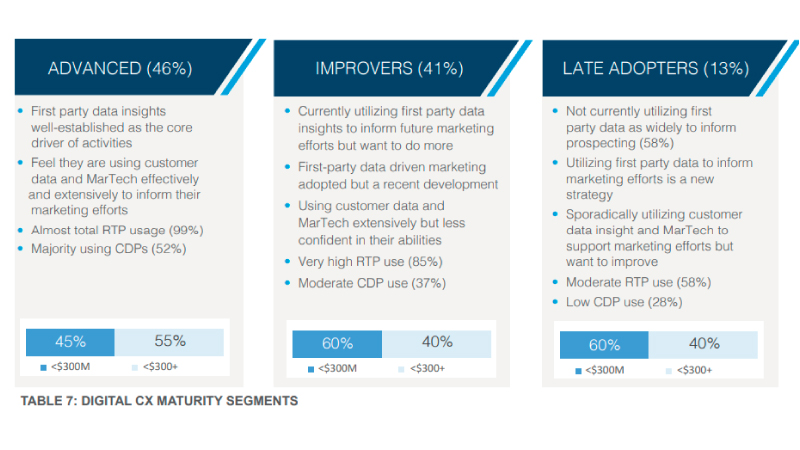
Takeaway
Finding a marketing technology is not the challenge as there is an abundance of options. This research has shown that marketers typically have good awareness of what is on offer, but for many, it is deciding the most appropriate solution. To be successful, marketers need to outline their marketing goals and develop use cases well in advance to ensure the technology selection can grow with the business as its marketing objectives evolve.
A variety of marketing technology solutions have been adopted and investment will continue, but most B2C organizations are now recognizing that they are not using their marketing technology to its full potential. Even the most advanced marketing teams need help to optimize their use of technology. A culture of collaboration between MarTech providers, marketing agencies and their customers is essential to ensuring marketing technology truly enables B2C organizations to provide excellent digital CX.
If you liked reading this, you might like our other stories
Taking the Self-Service Route
BORIS, a Logistical Nightmare?




